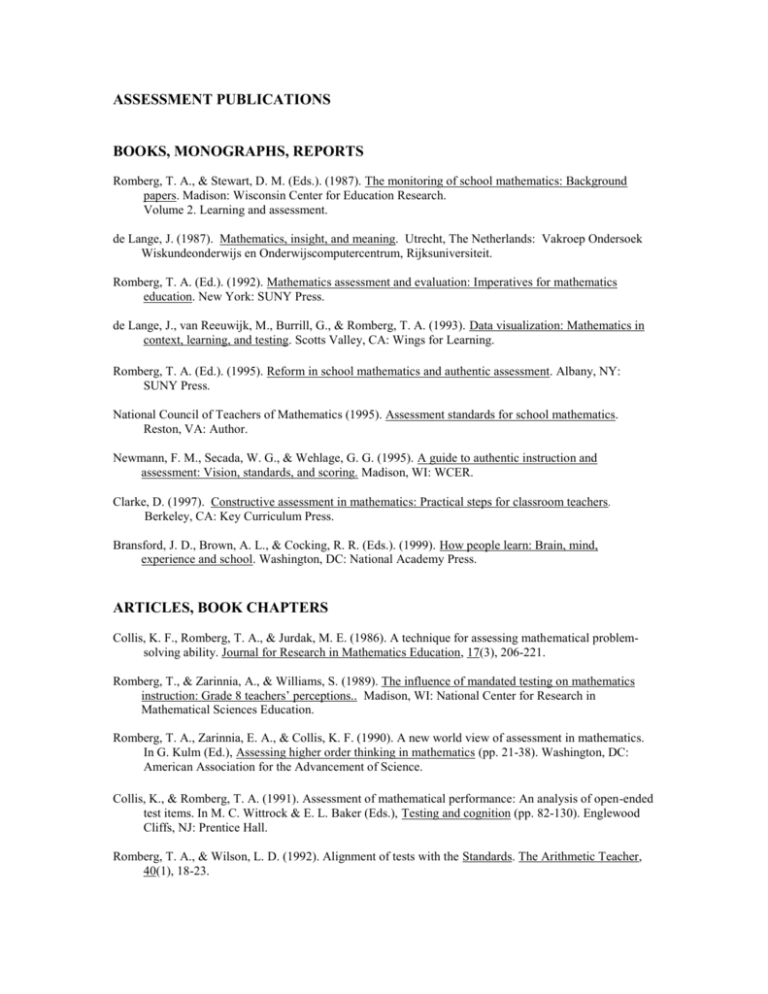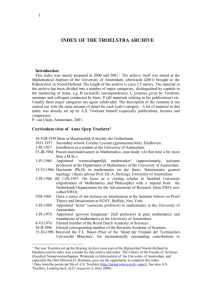WORD document
advertisement

ASSESSMENT PUBLICATIONS BOOKS, MONOGRAPHS, REPORTS Romberg, T. A., & Stewart, D. M. (Eds.). (1987). The monitoring of school mathematics: Background papers. Madison: Wisconsin Center for Education Research. Volume 2. Learning and assessment. de Lange, J. (1987). Mathematics, insight, and meaning. Utrecht, The Netherlands: Vakroep Ondersoek Wiskundeonderwijs en Onderwijscomputercentrum, Rijksuniversiteit. Romberg, T. A. (Ed.). (1992). Mathematics assessment and evaluation: Imperatives for mathematics education. New York: SUNY Press. de Lange, J., van Reeuwijk, M., Burrill, G., & Romberg, T. A. (1993). Data visualization: Mathematics in context, learning, and testing. Scotts Valley, CA: Wings for Learning. Romberg, T. A. (Ed.). (1995). Reform in school mathematics and authentic assessment. Albany, NY: SUNY Press. National Council of Teachers of Mathematics (1995). Assessment standards for school mathematics. Reston, VA: Author. Newmann, F. M., Secada, W. G., & Wehlage, G. G. (1995). A guide to authentic instruction and assessment: Vision, standards, and scoring. Madison, WI: WCER. Clarke, D. (1997). Constructive assessment in mathematics: Practical steps for classroom teachers. Berkeley, CA: Key Curriculum Press. Bransford, J. D., Brown, A. L., & Cocking, R. R. (Eds.). (1999). How people learn: Brain, mind, experience and school. Washington, DC: National Academy Press. ARTICLES, BOOK CHAPTERS Collis, K. F., Romberg, T. A., & Jurdak, M. E. (1986). A technique for assessing mathematical problemsolving ability. Journal for Research in Mathematics Education, 17(3), 206-221. Romberg, T., & Zarinnia, A., & Williams, S. (1989). The influence of mandated testing on mathematics instruction: Grade 8 teachers’ perceptions.. Madison, WI: National Center for Research in Mathematical Sciences Education. Romberg, T. A., Zarinnia, E. A., & Collis, K. F. (1990). A new world view of assessment in mathematics. In G. Kulm (Ed.), Assessing higher order thinking in mathematics (pp. 21-38). Washington, DC: American Association for the Advancement of Science. Collis, K., & Romberg, T. A. (1991). Assessment of mathematical performance: An analysis of open-ended test items. In M. C. Wittrock & E. L. Baker (Eds.), Testing and cognition (pp. 82-130). Englewood Cliffs, NJ: Prentice Hall. Romberg, T. A., & Wilson, L. D. (1992). Alignment of tests with the Standards. The Arithmetic Teacher, 40(1), 18-23. Romberg, T. A. (1992). Assessing mathematics competence and achievement. In H. Berlak, F. Newman, E. Adams, D. Archibald, T. Burgess, J. Raven, & T. Romberg (Eds.), Toward a new science of educational testing and assessment (pp. 23-52). Buffalo, NY: SUNY Press. Romberg, T. A. (1992). Concerns about mathematics assessment in the United States. In M. Stephens & J. Izard (Eds.), Reshaping assessment practices: Assessment in the mathematical sciences under challenge (pp. 35-45). Australian Council of Educational Research. Graue, M., & Smith, S. (1992). A conceptual framework for instructional assessment. Madison, WI: National Center for Research in Mathematical Sciences Education. Romberg, T. A. (1994). Assessment and technology. In G. Bright (Ed.), The impact of calculators on mathematics instruction. Lanham, MD: University Press of America. Graue, M. E., & Smith, S. Z. (1996). Shaping assessment through instructional innovation. Journal of Mathematical Behavior, 15, 113-136. Verhage, H., & deLange, J. (1997, April). Mathematics education and assessment. Pythagoras, 42, 1420. Shafer, M., & Romberg, T. A. (1999) Assessment in classrooms that promote understanding. In E. Fennema & T. A. Romberg (Eds.), Mathematics classrooms that promote understanding. Mahwah, NJ: Lawrence Erlbaum. Webb, D., & Meyer, M. (2000). Summary report of student achievement data for Mathematics in Context: A connected curriculum for grades 5-8. Madison, WI: WCER. Romberg, T. (2001). Monitoring student progress in mathematics. Madison, WI: NCISLA. Romberg, T., & Shafer, M. (in press). Mathematics in Context(MiC) – preliminary evidence about student outcomes. In S. Senk & D. Thompson (Eds.). (Title to be determined). Mahwah, NJ: Laurence Erlbaum. AERA PAPERS 2000 Feijs, E., & deLange, J. “The design of open-open assessment tasks” van Reeuwijk, M. “Making instructional decisions: Assessment to inform the teacher” Webb, D. “Enriching opportunities for assessment through classroom discourse” Wijers, M. “Explanations why? The role of explanations in answers to assessment problems” DISSERTATIONS Linda Wilson, 1993 (UW) "Assessment in a Secondary Mathematics Classroom" Marja van den Heuvel-Panhuizen, 1996 (FI) “Assessment and realistic mathematics education” Mary Shafer, 1996 (UW) “Assessment of Student Growth in a Mathematical Domain Over Time” Marvin Smith, 2000 (UW) “Classroom assessment and evaluation: A case study of practices in transition.
